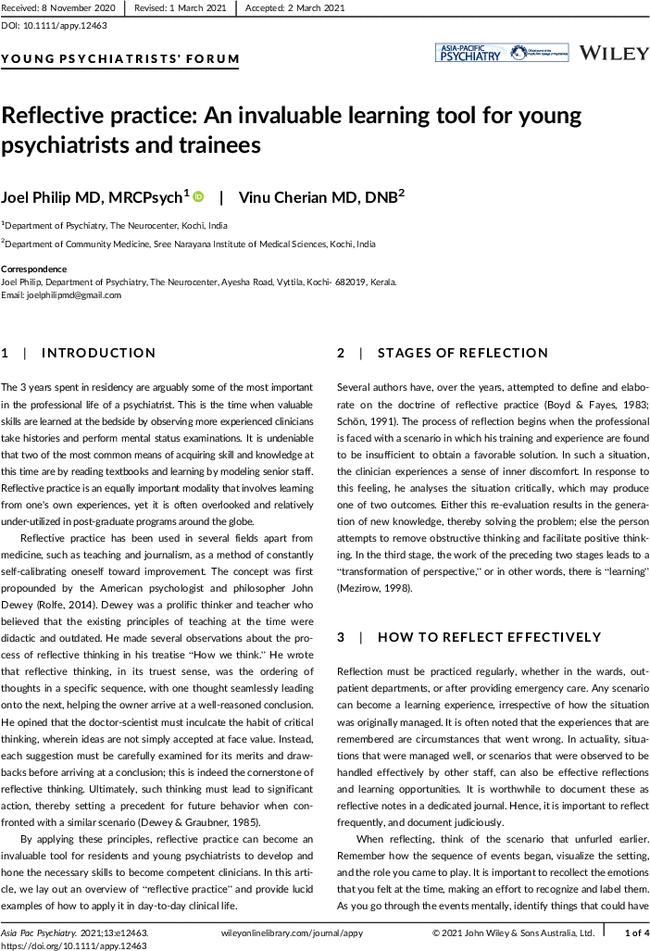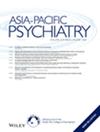反思实践:一个宝贵的学习工具,为年轻的精神科医生和学员
IF 3.4
3区 医学
Q2 PSYCHIATRY
引用次数: 0
摘要
本文章由计算机程序翻译,如有差异,请以英文原文为准。

Reflective practice: An invaluable learning tool for young psychiatrists and trainees
The 3 years spent in residency are arguably some of the most important in the professional life of a psychiatrist. This is the time when valuable skills are learned at the bedside by observing more experienced clinicians take histories and perform mental status examinations. It is undeniable that two of the most common means of acquiring skill and knowledge at this time are by reading textbooks and learning by modeling senior staff. Reflective practice is an equally important modality that involves learning from one's own experiences, yet it is often overlooked and relatively under-utilized in post-graduate programs around the globe. Reflective practice has been used in several fields apart from medicine, such as teaching and journalism, as a method of constantly self-calibrating oneself toward improvement. The concept was first propounded by the American psychologist and philosopher John Dewey (Rolfe, 2014). Dewey was a prolific thinker and teacher who believed that the existing principles of teaching at the time were didactic and outdated. He made several observations about the process of reflective thinking in his treatise “How we think.” He wrote that reflective thinking, in its truest sense, was the ordering of thoughts in a specific sequence, with one thought seamlessly leading onto the next, helping the owner arrive at a well-reasoned conclusion. He opined that the doctor-scientist must inculcate the habit of critical thinking, wherein ideas are not simply accepted at face value. Instead, each suggestion must be carefully examined for its merits and drawbacks before arriving at a conclusion; this is indeed the cornerstone of reflective thinking. Ultimately, such thinking must lead to significant action, thereby setting a precedent for future behavior when confronted with a similar scenario (Dewey & Graubner, 1985). By applying these principles, reflective practice can become an invaluable tool for residents and young psychiatrists to develop and hone the necessary skills to become competent clinicians. In this article, we lay out an overview of “reflective practice” and provide lucid examples of how to apply it in day-to-day clinical life. 2 | STAGES OF REFLECTION
求助全文
通过发布文献求助,成功后即可免费获取论文全文。
去求助
来源期刊

Asia‐Pacific Psychiatry
PSYCHIATRY-
CiteScore
7.80
自引率
0.00%
发文量
17
审稿时长
>12 weeks
期刊介绍:
Asia-Pacific Psychiatry is an international psychiatric journal focused on the Asia and Pacific Rim region, and is the official journal of the Pacific Rim College of Psychiatrics. Asia-Pacific Psychiatry enables psychiatric and other mental health professionals in the region to share their research, education programs and clinical experience with a larger international readership. The journal offers a venue for high quality research for and from the region in the face of minimal international publication availability for authors concerned with the region. This includes findings highlighting the diversity in psychiatric behaviour, treatment and outcome related to social, ethnic, cultural and economic differences of the region. The journal publishes peer-reviewed articles and reviews, as well as clinically and educationally focused papers on regional best practices. Images, videos, a young psychiatrist''s corner, meeting reports, a journal club and contextual commentaries differentiate this journal from existing main stream psychiatry journals that are focused on other regions, or nationally focused within countries of Asia and the Pacific Rim.
 求助内容:
求助内容: 应助结果提醒方式:
应助结果提醒方式:


